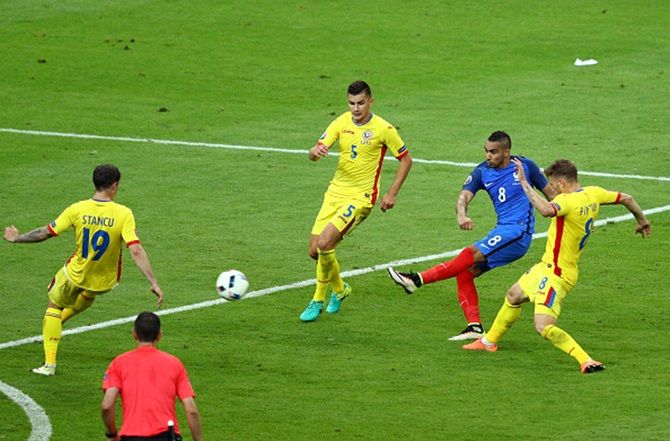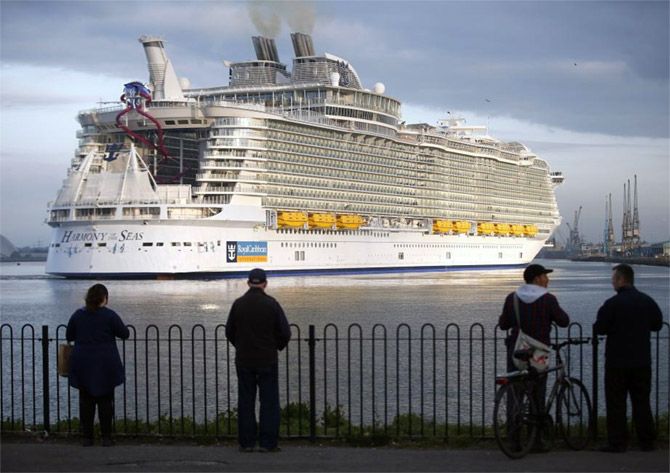As football fans arrive to watch Euro 2016, France's trade unions have undertaken a series of strikes to provoke a make-or-break situation.
Claude Arpi encounters both Gallic beauty and ugliness in the country of his birth.

IMAGE: France's Dimitri Payet scores his team's second goal against Romania in the opening game of Euro 2016 in Paris, June 11, 2016. Photograph: Paul Gilham/Getty Images
Incredibly charming France attracted some 84 million foreign tourists in 2013, indisputably making it the world's top tourist destination.
It is true that the country is beautiful and so many delectable edible and drinkable goodies are found nowhere else.
Travelling in my country of birth after 5 years, I had nearly forgotten the picturesque villages, the forest tracks, the old manors, the serene (and clean) rivers and France's unrivalled capital, Paris with its cafes, museums or shows.
One realises France's popularity when one sees the hordes of Chinese tourists clicking selfies around the Tour Eiffel or the Concorde Square; I did not see that many Indian tourists this time.
Not bad, since the tourist trade is a key sector for the French economy, accounting for more than 7 per cent of GDP and two million direct and indirect jobs.
But there is another side to France as well.
It is the 'striking' France with its powerful trade unions, which are able to spoil any fest. This year it will be Euro 2016 which attracts millions of aficionados from every corner of Old Europe.
On the opening day (thank God, France managed to defeat Romania), a shocking image appeared in Le Figaro; it showed a mountain of garbage piling in front of the famous Cafe Le Flore in Paris.
Why? Because the garbage collectors are on strike.
Parisians are grumbling and they are right, (though it is important not to forget that one of the particularities of the descendants of the Gaul tribes is to grumble about everything). But in this particular case, it is truly understandable.
While European football fans arrive in France to watch the Euro 2016, the CGT (Workers General Confederation), the hardline trade union, has undertaken 'rolling strikes' to provoke a 'make-or-break' situation.

A 'rolling strike' is another French specialty: It is when truckers, rail workers, dockers, teachers, etc, go on strike one after the other without prior notice.
Three out of four unions of Air France pilots have also decided to stop working. The pilots 'grumble' that the company is favouring too much KLM, Air France's partner. They have decided to organise a strike ‘rythmee (in 'slices') at 5:30 am, 8:30 am, 12 am, 3 pm, 9.30 pm and 23.59 pm.
Some optimist soothsayers see in the unions' actions a good omen: A similar strike went on for 10 days in 1998 and France won the football World Cup.
While May is traditionally the month of pleasant weather and the best period to go on strike, this year the unions have extended the deadline.
The present wave of strikes is against a new Labour Bill, known as the 'El Khomri Law' after the lady minister who introduced it.
Francois Hollande's government had dared to invoke Article 49.3 of the French constitution, allowing the government to bypass parliament to get the new labour law through.
The government used this rare procedure because part of the ruling Socialist Party were ready to vote against their government and like in India, whenever the government proposes a reform, the Opposition blocks it... for the sake of opposing something they would have liked to propose themselves.
These 'strikes' have however disastrous consequences.
A recent study on attractiveness across Europe shows that while the old continent is generally improving, France is left behind.
The report, published by the respected firm EY (formerly Ernst and Young), does not agree with President Hollande's statement that France is 'doing better.'
The report says there are worrying signs for the French economy: Of the 15 countries included in the survey, France was the only one to see an overall drop in 'attractiveness' in 2015.
While some 600 new foreign investment projects were started in France in 2015, there was an overall drop of 2 per cent compared to 2014. At the same time, the UK and Germany saw a rise of 20 percent and 9 percent respectively, with Hungary achieving a 104 percent increase.
Even though France does well in some sectors, this did not translate into actual investments and less than a quarter of investors were planning new projects in France for 2016.
During the present outbreak of strikes, President Hollande, whose popularity has rock-bottomed in recent months, has remained firm: 'Too many governments have given in, that's why the country was in the state we found it in 2012,' he said in an interview.
He will probably give in too.
Even for Indian investments, France remains hardly attractive. A few months ago, Business France, the national agency helping the international development of France's economy, released its 2015 Annual Report: Foreign investment in France. It analysed foreign investments in France and their contribution to the French economy.
Though over 120 Indian companies operate in France, employing 7,000 people, it is not much.
The main Indian groups involved are Sintex Industries (1,500 to 2,000 workers), the Tata Group (1,500), Mahindra and Mahindra (500), Mahajan Group (500) and Motherson Sumi Systems (400). This is not much.
Several factors are responsible for this relatively low performance: The tough French visa policy, the difficulty of the language (compared to the UK for example) or the lack of knowledge about India in general, are often cited. As a result the general investment climate is not rosy.

It is not that France cannot be innovative.
The largest cruise ship in the world was built in the western port town of Saint-Nazaire. It took 32 months in the French shipyard to construct the 362 meters long, 16-deck floating city which has some 2,500 rooms, 20 dining venues, 23 swimming pools and a park with more than 10,000 plants and trees. The $1 billion (Rs 6,700 crore/Rs 67 billion) Harmony of the Seas has a 6,360-passenger capacity.
In April, MSC Cruises signed with STX of Saint-Nazaire, for four new cruisers. The 200,000 tons ships, based on next generation technology, should be delivered in 2022.
Note that the Saint Nazaire dockyards, after a near-death experience a few years ago, have special agreements with their trade unions. This probably explains their performance.
DCNS, the French shipbuilding giant is also doing well; the State-owned company -- which is building 6 scorpene submarines in India with the Mazagaon docks -- is to build 12 submarines. The contract is said to be for $38 billion (Rs 2.51 lakh crore/Rs 2.51 trillion).
And Dassault makes good fighter planes!
One could conclude that a France without unions would do much better.
It is perhaps what the EL Khomeri Law is attempting to do: Not to remove the unions, but to decentralise their power, a 'grumbling a la carte' which would improve competitiveness.
At the same time, some rich investors have recently shown interest in France -- but for other reasons.
Jack Ma, the founder of Alibaba, the Chinese online business and the second richest man in the Middle Kingdom, bought last week, for some 12 million Euros (around Rs 90 crore/Rs 900 million), two famous vineyards near Bordeaux: Chateau Perenne and Chateau Guerry.
The properties belonged to Bernard Magrez, a famous wine tycoon. The 64-hectare Chateau Perenne produces yearly 500,000 bottles.
Chateau Guerry is the oldest vintage of a vineyard dating from the 18th century. A very old and exquisite manor is part of the deal.
But this is perhaps not the attractiveness France is looking for.
In the meantime, good results at Euro 2016 will certainly help the nation's morale.











 © 2025
© 2025